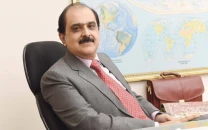To get priority, health issues need to be taken up by media and politicians
Participants give suggestions on how mainstream media should report on health.

Public health issues will never be addressed effectively unless they are highlighted by the media and become a part of the political agenda, particularly in the upcoming election.
This was the crux of a consultation, “Will Media Support the Cause of Public Health in Pakistan” held at a local hotel on Saturday. The discussion was organised by technical assistance unit (TAU ) of John Snow Incorporated (JSI) Pakistan, a research and advocacy institute for public health.
TV anchors, columnists and health reporters participated in the discussion. The event aimed to offer a platform for a pre-election dialogue between major political parties, the media and the development community.
A majority of TV anchors, however, were of the view that their shows would lose popularity if they discussed health issues. They believed people were more interested in watching politicians fight on TV shows than discussions on social issues. Fahad Hussain, an anchor, suggested that show hosts should highlight major health issues once a month.
Participants recommended media owners be asked to cover health policy and question political stakeholders about its importance in their manifestoes.
Dr Nabeela Ali, TAU chief of party and a public health expert, shared some shocking statistics about the state of the public health sector. The population has increased from 33.74 million in 1951 to over 180 million in 2012, while delivery of health services remains limited.
“Pakistan is all set to cross the 200 million mark in 2020,” she noted. There are only 6,000 midwives serving 180 million people instead of the required 60,000. She presented a compilation of statistics from national and international organisations as well as surveys. Of the $22 spent per person annually on health, $14 is out-of-pocket expense and $8 are contributed by the government.
Doctors and health specialists are not willing to work in remote areas, leading to a higher death rate due to lack of basic health facilities. Around 35% to 45% deaths in district headquarters hospitals take place due to unavailability of health services, she said.
Around 5% of people die while travelling mainly because of poor transportation system and only 47% is the coverage level of immunising children under the age of five, said Dr Ali. In the near future, more children will have low IQ due to malnutrition which will ultimately affect the economy.
She suggested health awareness be made part of education and stressed upon the need for accountability in the health sector.
Published in The Express Tribune, November 4th, 2012.



















COMMENTS
Comments are moderated and generally will be posted if they are on-topic and not abusive.
For more information, please see our Comments FAQ